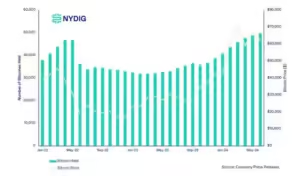DMM Bitcoin Faces Massive $300M Unauthorized Leak

Quick Take:
- DMM Bitcoin, a Japanese crypto exchange, reports a loss of over $300 million in Bitcoin due to an “unauthorized leak.”
- Investigation is underway with some services restricted to prevent further losses.
- All Bitcoin deposits are guaranteed, DMM assures customers.
- If confirmed as a hack, it would be the eighth-largest crypto theft ever.
DMM Bitcoin Suffers Massive $300M Unauthorized Leak
In a significant security breach, Japanese cryptocurrency exchange DMM Bitcoin reported the loss of 4,502.9 Bitcoin, valued at approximately $308 million. The incident, described as an “unauthorized leak,” is currently under investigation. Crypto security firm Elliptic highlighted that if hacking is confirmed, this event would rank as the eighth-largest crypto theft in history.
Investigation and Immediate Actions
DMM Bitcoin has initiated a thorough investigation into the loss, implementing several precautionary measures to curb any additional outflows. The exchange has temporarily restricted certain services, including crypto withdrawal processing, to ensure the security of its assets.
In a blog post, DMM reassured its users, stating, “Please rest assured that we will procure the equivalent amount of BTC leaked with support from our group companies and guarantee the full amount of the entire amount of Bitcoin deposited by our customers.” This commitment aims to restore customer confidence and mitigate the impact of the breach.
Potential Scale of the Hack
Elliptic, which monitors and analyzes crypto transactions, stated that if the incident is confirmed as a hack, it would be the largest since the infamous $477 million exploit of the now-bankrupt crypto exchange FTX in November 2022. Elliptic’s investigative tools have tracked the stolen Bitcoin, noting that the assets have been split and moved to new wallets, complicating recovery efforts.
Historical Context and Comparison
This breach marks a significant event in Japan’s cryptocurrency history, ranking third behind the 2018 Coincheck hack, where over $530 million worth of XEM was stolen, and the notorious Mt. Gox exchange collapse in 2014, which saw the theft of over 809,000 BTC across multiple hacks.
The recent incident at DMM Bitcoin underscores the persistent vulnerabilities within the crypto industry, despite advancements in security measures and regulatory oversight.
Response from the Community
Crypto enthusiasts and industry experts have reacted strongly to the news, emphasizing the importance of robust security protocols and the need for constant vigilance. The phrase “not your keys, not your crypto” resonates once again, highlighting the risks associated with keeping large amounts of digital assets on centralized platforms.
Broader Implications
According to a crime report by blockchain analysis company Chainalysis, approximately $1.7 billion in crypto was stolen last year, a significant drop from $3.7 billion in 2022. However, incidents like the DMM Bitcoin breach illustrate that the threat of large-scale thefts remains ever-present.
The creation of bounty programs on platforms like Arkham Intel could potentially aid in recovering the stolen funds or identifying the perpetrators. These programs incentivize the crypto community to leverage their expertise in tracking and retrieving stolen assets.
Looking Forward
As DMM Bitcoin continues its investigation, the exchange’s immediate focus is on securing customer assets and preventing further breaches. The broader crypto community will be watching closely to see how DMM navigates this crisis and whether the stolen funds can be recovered.
The incident serves as a stark reminder of the critical need for comprehensive security measures in the rapidly evolving world of cryptocurrency. Ensuring the safety of digital assets must remain a top priority for all exchanges and stakeholders in the industry.



